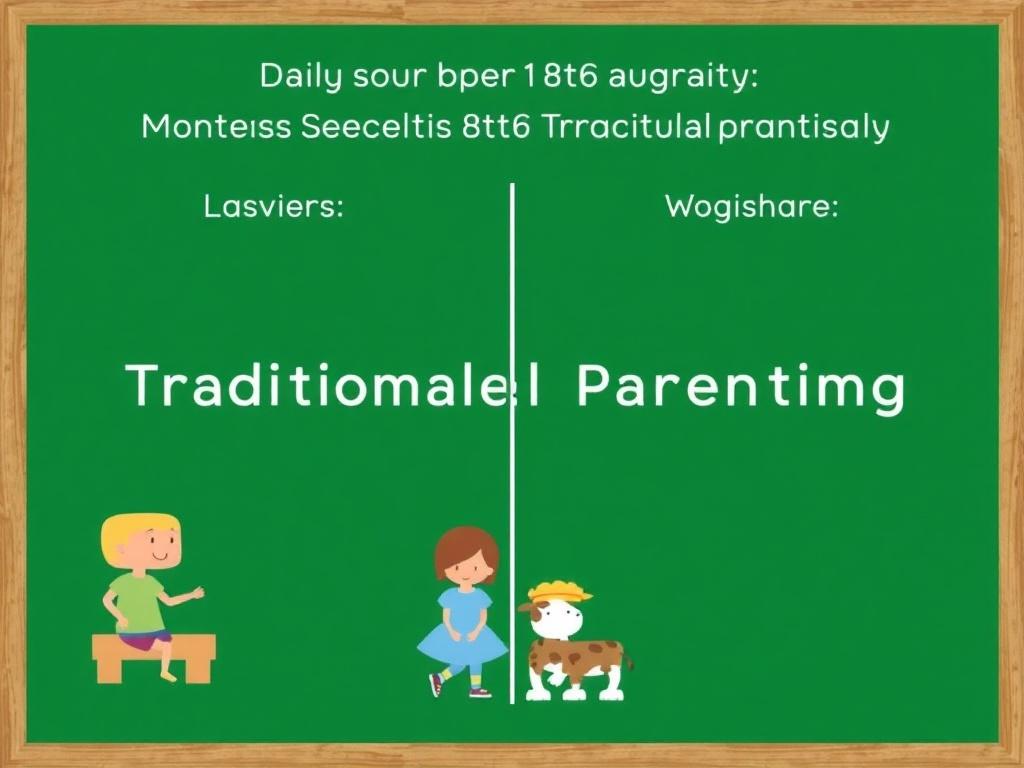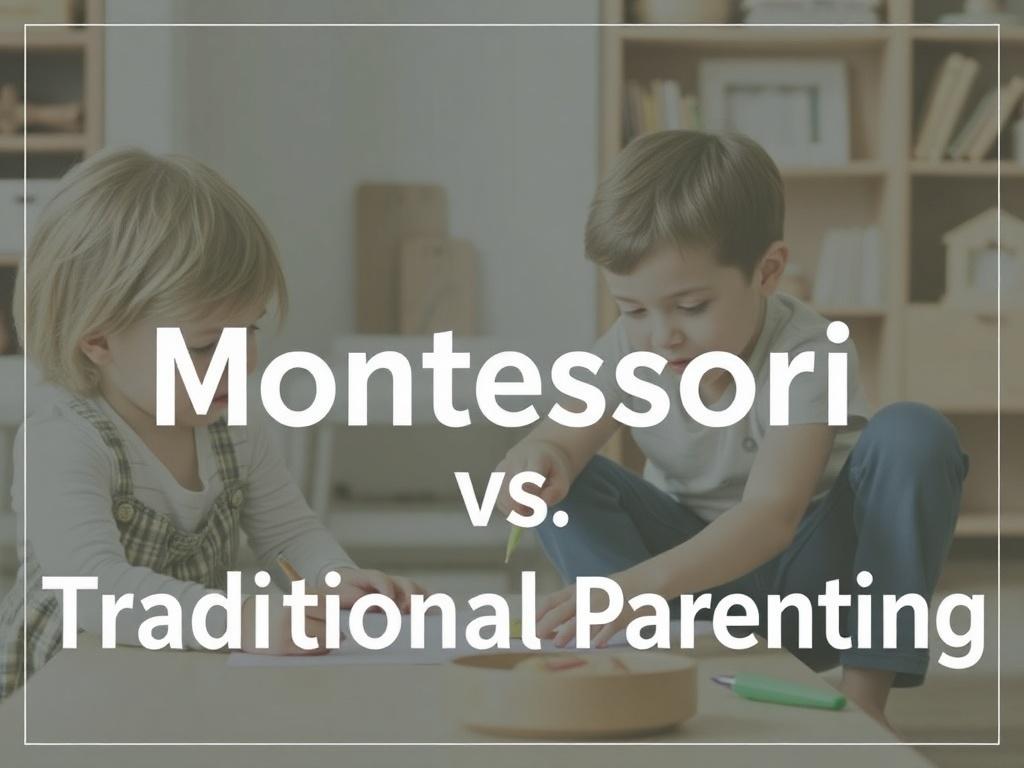SQLITE NOT INSTALLED
Parenting is one of the most impactful roles in life, shaping the future of children and, ultimately, society. As parents, we constantly seek the best ways to support our children’s growth, learning, and development. In recent decades, two parenting philosophies have stood out worldwide: Montessori and traditional parenting. Both approaches have their dedicated followers, passionate debates, and proven benefits. But what exactly distinguishes Montessori vs. traditional parenting? How do these approaches differ in philosophy, daily practice, and outcomes? This comprehensive article will explore the key differences in a friendly, engaging way, helping you understand which approach may align with your family’s values and goals.
Understanding Montessori Parenting
The Montessori parenting approach is derived from the educational philosophy of Dr. Maria Montessori, an Italian physician and educator who developed an innovative method of teaching children in the early 1900s. Her approach centers around respect for the child’s natural curiosity, independence, and pace of learning. Montessori parenting encourages hands-on engagement and self-directed activity, allowing children to learn by doing and exploring the world around them freely but within well-prepared environments.
One of the key concepts is that children have an intrinsic desire to learn. Parents who adopt the Montessori method typically create a structured environment where children can choose activities from a range of options designed to develop practical life skills, sensory awareness, and cognitive abilities. The idea is not to push knowledge onto the child but to allow it to unfold naturally as their interests and capabilities evolve.
In Montessori parenting, adults act as guides or facilitators rather than traditional authoritarian figures. They observe children closely, stepping in minimally and providing support only when necessary. The goal is to foster independence and confidence.
Core Principles of Montessori Parenting
- Child-led learning: Children decide their activities based on interest.
- Prepared environment: A space tailored to the child’s developmental needs.
- Respect for the child: Honoring their pace, choices, and individuality.
- Hands-on learning: Emphasis on practical experiences over rote memorization.
- Encouraging independence: Allowing children to do tasks on their own.
The philosophy extends beyond education into the parenting realm — promoting a lifestyle where the child’s autonomy and unique trajectory are prioritized.
Understanding Traditional Parenting
Traditional parenting refers broadly to the conventional methods of raising children that have been followed across cultures and generations. While styles can vary widely depending on cultural, socio-economic, and individual family values, some common themes characterize traditional parenting. These often include a structured routine, clear rules, parental authority, and direct teaching. The parent is usually the leader in the child’s learning process, providing guidance, discipline, and direction.
In traditional parenting, children are often expected to follow set rules and schedules, respecting authority figures and conforming to family and societal norms. The approach may prioritize obedience, family cohesion, and socialization alongside academic achievement. Parents often take an active role in teaching values, manners, and responsibility, sometimes emphasizing discipline as a foundation of character building.
This method can include various sub-styles, such as authoritarian, authoritative, or permissive parenting. However, the broad notion of traditional parenting involves clear expectations and involvement by the caregiver in shaping the child’s behavior through praise, correction, or instruction.
Core Principles of Traditional Parenting
- Parental authority: Parents lead decisions and set boundaries.
- Structured routines and rules: Providing consistency and predictability.
- Direct teaching: Parents actively instruct and correct behaviors.
- Emphasis on obedience: Teaching respect for authority and social norms.
- Family-centered values: Encouraging shared customs and responsibilities.
While often criticized for being rigid, traditional parenting continues to be favored for its clarity and stability, especially in communities valuing discipline and respect for tradition.
Montessori vs. Traditional Parenting: Philosophical Foundations
Before going deeper into practical differences between Montessori vs. traditional parenting, it’s essential to understand their philosophical underpinnings. These philosophies shape every aspect of their approach, from decision-making to child engagement and conflict resolution.
Montessori Philosophy: Child as Natural Learner
The Montessori philosophy sees the child as a naturally curious and active agent in their own development. Dr. Maria Montessori believed that given the right environment and freedom, children will spontaneously learn skills and information critical for their growth. This approach views mistakes as learning opportunities and respects the individual’s developmental timeline.
Underlying this is a belief in freedom within limits; freedom meaning the child’s ability to make meaningful choices, and limits meaning that the environment is thoughtfully arranged to keep them safe and focused. The parent’s role is largely observational — to understand the child’s needs and to prepare an environment that invites exploration and mastery. This respects the child’s dignity and nurtures intrinsic motivation.
Traditional Philosophy: Parent as Guide and Authority
Traditional parenting often rests on the idea that children need guidance, structure, and boundaries to thrive. This philosophy acknowledges children’s potential but emphasizes the parent’s responsibility to teach right from wrong, provide consistent discipline, and shape the child’s character. It tends to see the adult as the protector and leader, responsible for creating a secure, orderly environment.
The emphasis is on preparing children to function well within family and society by imparting values, respect, and social responsibility. Obedience and routine are often viewed as vital to developing self-control and moral understanding.
Comparison Table: Philosophical Foundations
| Aspect | Montessori Parenting | Traditional Parenting |
|---|---|---|
| View of Child | Natural learner, independent explorer | Needs guidance, dependent on parental leadership |
| Role of Parent | Observer, facilitator, guide | Authority figure, teacher, disciplinarian |
| Approach to Learning | Child-led, experiential, flexible pace | Structured, direct instruction, standardized pace |
| Discipline | Self-discipline cultivated through freedom and respect | External discipline and rules enforced by parents |
| View on Freedom | Freedom within prepared limits | Limited freedom guided by rules and routines |
Daily Routines: Montessori vs. Traditional Parenting

One of the most visible differences between Montessori and traditional parenting lies in the daily routines and how children spend their time. Routines affect everything from play and meals to learning and rest. Let’s take a closer look.
Montessori Daily Routine
In Montessori parenting, the daily routine prioritizes the child’s ability to choose activities freely within a prepared environment. Often, parents set designated periods where children can engage with learning materials independently. This encourages concentration and decision-making.
Typical Montessori daily activities might include practical life skills like pouring water, tying shoelaces, or food preparation. Sensory exploration, art, and nature time are integrated naturally. Parents avoid rushing children from one task to another and allow plenty of uninterrupted time for deep work and play. Rest and meals are also approached mindfully, often involving children helping to prepare snacks or set the table to build responsibility.
Traditional Daily Routine
Traditional parenting focuses heavily on structure and predictability. A typical day is filled with scheduled times for meals, schooling, play, chores, and bedtime. Parents often set specific goals or lessons for children to complete, guiding them throughout the day. While free play is encouraged, it usually happens within pre-defined limits or time slots.
This approach values consistency, believing that predictable routines provide security for children. Parental involvement is frequent, often including direct instruction on homework, discipline, and behavior management. Responsibilities such as chores are assigned as part of teaching discipline and contribution to the family unit.
Montessori vs. Traditional Parenting: Daily Routine Comparison
| Aspect | Montessori Parenting | Traditional Parenting |
|---|---|---|
| Activity Choice | Child chooses freely from prepared options | Parent directs activities and schedules |
| Learning Style | Hands-on, experiential, self-paced | Instruction-based, structured, adult-led |
| Role of Parent | Observe and facilitate | Direct and instruct |
| Playtime | Unstructured, child-initiated | Scheduled and sometimes limited |
| Chores and Responsibility | Integrated naturally, child manages responsibility | Assigned by parents, monitored |
| Meals | Involvement in preparation and serving encouraged | Typically parent-managed |
Discipline Approaches: Montessori vs. Traditional Parenting
Discipline is an essential part of raising children, but the ways parents approach discipline vary greatly between Montessori vs. traditional parenting.
Montessori Discipline
Montessori discipline centers on self-regulation and internal motivation. Rather than using punishment or rewards, it encourages children to understand the consequences of their actions through natural outcomes and reflection. Discipline is more about guiding children to develop respect for themselves, others, and their environment.
Parents using the Montessori method tend to avoid yelling or physical punishments. If conflicts arise, they help children verbalize feelings, problem-solve, and restore harmony. This approach builds emotional intelligence and empathy over time, equipping children with lifelong self-discipline skills.
Traditional Discipline
Traditional parenting often relies on clearly defined rules and consequences, including punishments and rewards. The goal is to ensure compliance and teach responsibility through external control. Consequences might range from time-outs to loss of privileges or verbal reprimands.
While some families employ authoritative methods that combine warmth with discipline, others may lean toward a more authoritarian style. Parental authority is emphasized, and obedience is often a key expectation.
Discipline Comparison List
- Montessori Discipline: Focus on self-discipline, natural consequences, empathy development.
- Traditional Discipline: Rule enforcement, external consequences, obedience emphasis.
- Montessori: Encourages verbal communication and problem-solving.
- Traditional: Uses rewards and punishments to shape behavior.
- Montessori: Avoids physical or verbal harshness.
- Traditional: May incorporate firm corrective measures.
Learning and Education in Montessori vs. Traditional Parenting

Education and learning are cornerstones of both Montessori and traditional parenting, yet the methods and beliefs about how children learn differ significantly.
Montessori Learning Approach
Montessori education encourages children to learn at their own pace, using hands-on materials that engage multiple senses. It is self-directed, with the child choosing tasks that challenge their skills. The environment is rich and intentionally designed to foster concentration, discovery, and independence.
Parents support education outside of formal schooling by integrating Montessori principles at home, such as offering real-life experiences and avoiding rote memorization. The emphasis is on nurturing curiosity and problem-solving.
Traditional Learning Approach
Traditional parenting often aligns with structured schooling models, emphasizing memorization, repetition, and teacher-led instruction. Parents engage in homework support, enforce practice routines, and stress academic achievement based on grades and measurable progress.
The focus is on mastering specific subjects with clear objectives and timelines, often reinforcing discipline through study habits and deadlines.
Education Style Comparison Table
| Aspect | Montessori Parenting | Traditional Parenting |
|---|---|---|
| Learning Pace | Child-determined | Fixed, age-based |
| Materials Used | Hands-on, sensory, self-correcting | Textbooks, worksheets, direct instruction |
| Role of Parent | Facilitator and observer | Teacher and supervisor |
| Assessment | Observational, informal | Formal testing and grading |
| Focus | Whole child development—cognitive, emotional, social | Academic achievement and discipline |
Socialization and Emotional Development
Another vital area to consider when comparing Montessori vs. traditional parenting is how children’s social and emotional growth is nurtured.
Montessori Approach to Social and Emotional Growth
Montessori parenting encourages empathy, cooperation, and respect for others. Socialization happens within mixed-age groups where older children naturally mentor younger ones, fostering leadership and compassion. Parents model calm communication and emotional regulation, helping children develop strong interpersonal skills.
Conflict resolution is seen as an opportunity to teach empathy and problem-solving, rather than punishment. Emotional literacy is encouraged through naming feelings and validating the child’s experiences.
Traditional Approach to Social and Emotional Growth
Traditional parenting values respect for authority and social rules as a key part of emotional development. Social skills are often taught through family rituals, manners, and expectations of obedience. Parents may use praise and correction to shape behavior and encourage conformity within social groups like school or community.
Emotional expression sometimes takes a more controlled form, with parents emphasizing self-control and acceptance of societal norms.
Social-Emotional Growth Comparison List
- Montessori: Mixed-age socialization, peer mentoring, emotional literacy focus.
- Traditional: Respect for authority, manners, structured social roles.
- Montessori: Encourages open emotional communication.
- Traditional: May prioritize emotional restraint.
- Montessori: Conflict resolution is collaborative.
- Traditional: May use rules and consequences to manage conflicts.
Pros and Cons: Montessori vs. Traditional Parenting
Both parenting styles have unique strengths and challenges. It’s valuable to look at the pros and cons of each to gain a balanced perspective.
Montessori Parenting Pros
- Encourages independence and self-motivation.
- Respects child’s individuality and pace.
- Develops critical thinking through hands-on learning.
- Fosters deep concentration and inner discipline.
- Supports emotional intelligence and empathy.
Montessori Parenting Cons
- Can be challenging to maintain structure at home.
- Requires parents to be patient and observant.
- May feel less directive for parents used to traditional roles.
- Resources and Montessori-trained communities may be limited.
Traditional Parenting Pros
- Provides clear structure and expectations.
- Familiar method for many families and cultures.
- Emphasizes discipline and social conformity.
- Often easier to integrate with formal schooling.
- Parents take active leadership role in child’s development.
Traditional Parenting Cons
- Can stifle creativity and independence.
- Risk of over-discipline or authoritarianism.
- May not adapt well to individual learning paces.
- Sometimes less focus on emotional development.
Blending the Best of Both: A Balanced Approach

Many parents today find that the answer is not to choose strictly between Montessori vs. traditional parenting but rather to blend the best elements of both to suit their child’s unique personality and family context.
For example, parents might provide a Montessori-inspired environment emphasizing freedom and hands-on learning during playtime, while maintaining traditional routines for meals, bedtime, and schooling. Discipline may blend natural consequences with clear family rules and consistent enforcement.
Respecting the child’s individuality does not have to conflict with parental authority. Likewise, structure and routine can coexist with freedom and exploration if balanced mindfully.
Helpful Tips for Combining Montessori and Traditional Parenting
- Create a prepared environment at home to encourage independence and exploration.
- Keep consistent routines to provide security and predictability.
- Encourage decision-making by allowing choices within safe boundaries.
- Set clear rules and explain their purpose to teach responsibility.
- Model empathy and emotional expression, fostering open communication.
- Use discipline thoughtfully, balancing natural consequences with guidance.
- Observe your child’s needs and be flexible in adjusting your approach.
Conclusion: Montessori vs. Traditional Parenting—What’s Right for You?
Montessori and traditional parenting each offer valuable insights on raising confident, capable, and happy children. The Montessori philosophy celebrates the child’s natural development, creativity, and independence, while traditional parenting provides structure, discipline, and guidance rooted in long-standing cultural practices.
Choosing between Montessori vs. traditional parenting is not about picking a “right” or “wrong” method but understanding what aligns best with your family’s values, your child’s temperament, and your lifestyle. It’s also important to remember that parenting is fluid – you can adjust strategies as your child grows and changes.
Embrace the aspects that resonate, be attentive to your child’s needs, and cultivate a parenting approach filled with love, respect, and patience. After all, the goal is to nurture well-rounded individuals who can thrive in a complex world.
Thank you for joining this deep dive into Montessori vs. traditional parenting. We hope it inspires new perspectives and thoughtful choices on your parenting journey.
